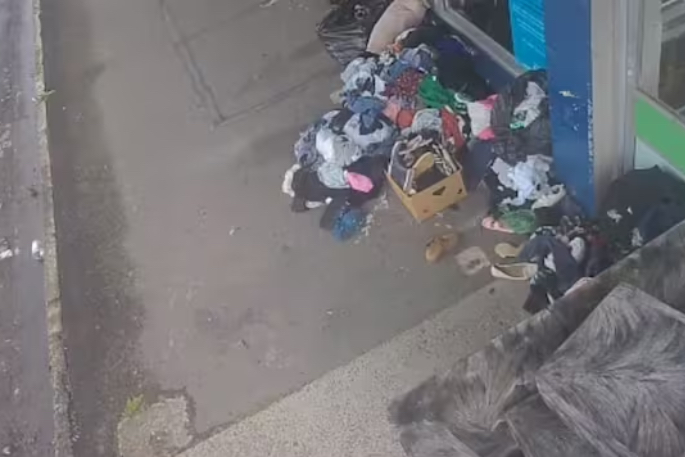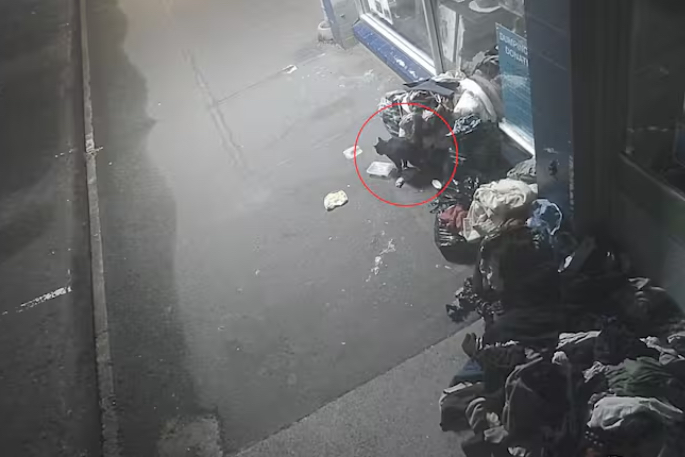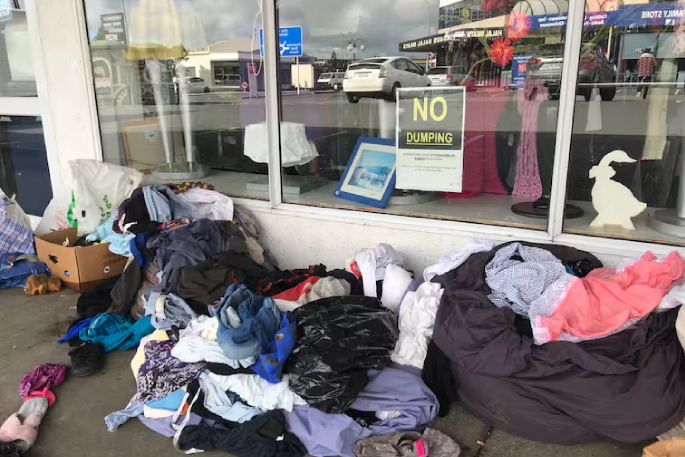Soiled mattresses, scattered clothing, rubbish soaked in cat pee, rotting food and damaged household goods.
These are among the foul sights and smells greeting charity op shop staff and volunteers in Tauranga and Rotorua.
They say it’s an expensive and growing problem, and the nasty clean-up jobs leave team members feeling disheartened.
Dumpers using charity shops to dispose of dirty, damaged and blatantly unsellable items are “taking the p**s” and costing thousands of dollars intended for patient care, a hospice boss says.
Waipuna Hospice chief executive Richard Thurlow says its six second-hand stores in Tauranga and Western Bay were a major funding source for the specialist palliative care it provided hundreds of patients a year.
He says people “blatantly dumping unsellable items and household rubbish” at the stores was a growing problem, with this year’s disposal bill approaching $120,000 - almost double that budgeted.
 Waipuna Hospice chief executive Richard Thurlow. Photo / George Novak.
Waipuna Hospice chief executive Richard Thurlow. Photo / George Novak.
“I think some people are just taking the p**s and that’s unacceptable as it’s taking away money that could be used to care for more patients in their homes,” he says.
He says the shop had a big skip bin of largely “trash, literally” collected most days.
“It’s not okay, especially when we’re struggling to raise enough funds to meet the shortfall in our annual operating costs.”
Habitat for Humanity has two Bay of Plenty ReStores and Central region chief executive Nic Greene says illegal dumping disposal cost about $20,000 a year.
“Unfortunately, most days staff turn up at work to find piles of donations left outside the Rotorua store, which have been rummaged through, scattered and toileted on by animals or exposed to the weather.”
“We get bags and bags of clothes strewn over the footpath, furniture with pieces missing, broken glass and bric-a-brac mixed up with linen.”
 Some of the illegally dumped items at the Habitat for Humanity's ReStore charity shop in Rotorua. Photo / Habitat for Humanity.
Some of the illegally dumped items at the Habitat for Humanity's ReStore charity shop in Rotorua. Photo / Habitat for Humanity.
It was largely unsellable and unsafe for staff to sort and most went straight to the tip, Nic says.
“You can imagine the impact on our staff when this is a daily occurrence, tidying up piles of soiled goods.”
 A cat urinates on illegally dumped items outside the Habitat for Humanity ReStore Rotorua shop. Photo / Supplied.
A cat urinates on illegally dumped items outside the Habitat for Humanity ReStore Rotorua shop. Photo / Supplied.
Nic provided security camera footage of a cat urinating on rubbish outside the store, saying it “pretty much” summed up the team’s daily experience.
He urged dumpers to “think beyond themselves”.
“We have to pay to dump these items. That means we have less to put into our housing programme.”
 Habitat for Humanity's central region chief executive Nic Greene. Photo / Supplied.
Habitat for Humanity's central region chief executive Nic Greene. Photo / Supplied.
Destiny Calhoon, operational manager at Tauranga’s Bridge Community Store, says since the Maleme St transfer station closed 18 months ago, illegal dumping had worsened.
Disposal fees were $500 to $800 a month for the store, which partnered with several community charities, most working with local teens and children.
“It’s disheartening to have the amazing support from our incredibly generous donors who donate so many high-end items and the work of wonderful volunteers overshadowed by some people’s thoughtlessness,” Destiny says.
“We get illegal dumping, especially over weekends and often after being closed for a few days, we’ll find bags and boxes piled up sometimes containing broken or quite damaged items. Sometimes dumped bags are full of household rubbish, literally … we’ve even had leftover chicken carcasses.”
 Bridge Community Store operational manager Destiny Calhoon outside the op shop on Fraser St, Tauranga. Photo / Alex Cairns.
Bridge Community Store operational manager Destiny Calhoon outside the op shop on Fraser St, Tauranga. Photo / Alex Cairns.
She says other items dumped included old sofas and armchairs in such disrepair they could never be sold, stained or ripped mattresses, items with cat dander (dried skin) on them, or goods left out in the rain.
Gina Dow, regional retail manager for the Red Cross’ Central North Island area, says the charity had three second-hand stores in Rotorua and a temporarily closed Tauranga store.
She says most people were “amazing” and donated quality items during opening hours, but a few came after hours to leave items that were not saleable, rain-damaged or “picked over”.
“Disposing of those items is just one of the costs we budget for each year.”
It helped divert about 2 million items from landfill annually, including enabling suitable metals and fabrics to be recycled or reused by local groups.
Other charity stores were approached but some declined to comment, fearing it would encourage more dumping.
Under the Litter Act 1979, individual illegal dumpers could face fines of up to $5000.
Tauranga City Council sustainability and waste manager Daniel Smith says the council supported about 17 charity shops by waiving some disposal fees. It had helped cover costs for about 755 tonnes of rubbish in the past three years.
He says charity shops provided great services, including “keeping goods in circulation and out of landfills”.
Daniel says the council was looking into its approach to dealing with illegal dumping, in conjunction with other councils.
“We also would like the community’s support to help us identify who is dumping goods.”
Rotorua Lakes Council’s waste and climate change manager Craig Goodwin says it had no jurisdiction to deal with illegal dumping on private property, and incidents should be reported to the police.
“We encourage people to do the right thing – illegal dumping [outside charity stores] costs the whole community.”
Western Bay of Plenty District Council solid waste contract manager Tony Wilson says the council had one enquiry from a charity store in the past year.
“Charity stores are not dumping grounds for broken or unusable items. Ask yourself, does the charity shop sell the items I’m trying to dispose of, would I buy these items? If the answer is no, please dispose of these items responsibly - don’t make it someone else’s problem.”
Sandra Conchie is a senior journalist at the Bay of Plenty Times and Rotorua Daily Post who has been a journalist for 24 years. She mainly covers police, court and other justice stories, as well as general news. She has been a Canon Media Awards regional/community reporter of the year.



4 comments
Charity Shop Dumping
Posted on 19-05-2024 08:57 | By Sycamore2
Most people who dump items outside charity shops are too lazy or cheap to go to the tip. If items are left outside the shops on the footpaths which I assume are council property, why is the responsibility of the shop to remove and dispose these items?
Unuseable donations
Posted on 19-05-2024 14:52 | By oceans
People who ar dumping their broken furniture and damaged/soiled clothing know exactly what they are doing. They are too lazy to take it to the council refuse sites and pay fees. You can ask people not to dump rubbish until you are black and blue in the face but it won't make any difference. People will still dump their rubbish at the op shops. The fact they are doing it when the shops are closed know exactly what they are doing. This will not stop unless you identify the offenders and take action. The first action is to give all their rubbish back to them. Failing that, only accept items during opening hours.
Dump Fees
Posted on 20-05-2024 07:05 | By Thats Nice
Going to the dump isn't exactly inexpensive now. I'm not surprised at all with large items being dumped - not everyone owns a trailer also.
@Sycamore2
Posted on 20-05-2024 12:35 | By Yadick
You raise a very valid point. If it's dumped on the footpath it's council's issue. Obviously they own the footpaths and that's why hospitality businesses are being screwed to pay for footpath space. Therefore these Op shops need to be phoning TCC and getting them to come and urgently clean up.
Leave a Comment
You must be logged in to make a comment.